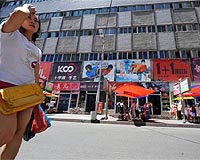 |
Urumqi, China (AFP) July 13, 2009 Like many ethnic Uighurs, businessman Anwar hopes greater world interest in the Muslim minority following deadly unrest in this remote Chinese city could lead to long-time grievances being addressed. Sitting on an overturned bucket he uses as a chair in his cramped apartment, Anwar spoke in angry whispers about religious restrictions and other forms of repression many Uighurs say they suffer under Chinese rule. "In my lifetime we have not had an opportunity like this," Anwar said of the recent international attention on the eight million Uighurs in China's far northwest Xinjiang region. "We call on America or the United Nations to come here and see the situation for themselves and help us." The Uighurs created headlines around the world after taking to the streets of Urumqi, Xinjiang's capital, on July 5 in protests that quickly turned violent. The government said 184 people died that day, when some Uighurs savagely attacked members of China's dominant Han ethnic group and razed their shops. However the death toll from that day of unrest, a security crackdown and subsequent clashes is likely to be higher. When told of world criticism about some of China's policies toward Uighurs, Anwar, who wore a traditional four-cornered embroidered Uighur cap, broke into a broad grin as he stroked a scruffy beard. "We welcome this. We hope the rest of the world can stop ignoring us," Anwar said in Mandarin. Tucked in a remote corner of China, and without a charismatic globe-trotting figure like Tibet's Dalai Lama to trumpet their cause, many Uighurs expressed hope that the recent unrest here had finally given them a window on the world. Aside from what they say is Beijing's religious and political oppression, Uighurs complain of an influx of Han migrants that they say is extinguishing their culture. But those hopes could soon prove unfounded, experts said, with the unrest likely fortifying China's resolve to maintain its tight grip on Xinjiang, a strategic and energy-rich region that crosses into Central Asia. Publicity about Uighurs attacking Han will also likely damage their public relations efforts. "In some ways, this has helped the Uighur cause by raising their (world) profile," said Dru Gladney, an expert on the Turkic-speaking central Asian people at Pomona College in California. "But domestically, the government has successfully turned this against the Uighurs and made them look very bad. It has demonstrated that the Uighurs are violent." The Islamic world's criticism of Chinese policies towards the Uighurs has been the strongest, with Turkey's prime minister last week calling them "a kind of genocide." But China, which says Xinjiang faces a Uighur terrorist threat, has given no hint of any softening. Official pronouncements have vowed a tough crackdown and made little or no mention of Uighur complaints. Communist Party Politburo member Zhou Yongkang, the nation's security czar, over the weekend called for a "steel wall" of security against "hostile forces". Gladney said he saw little hope of a government rethink to any policies relating to Uighur grievances. "That has all been put on hold for a while," he said. The Islamic world's criticism also is likely to prove only a blip against China's rising economic and diplomatic clout, Gladney added. Many Uighurs agreed, expressing deep dismay that the violent riots had cost them the moral high ground and saying darker times lay ahead. Akbar, a college-educated Uighur in his late 20s, has not held a steady job for three years, saying job fairs in Urumqi often say "Uighurs need not apply." He left Urumqi at the weekend for his rural hometown several hours' drive away, fearing arrest amid reported police sweeps on young Uighur men, although he denies involvement in the unrest. "Many of us (Uighurs) had wondered how it could be worse for us but we are now entering into a new period that will be bad for a long time, so I just want to spend time with my family now," he said. Share This Article With Planet Earth
Related Links China News from SinoDaily.com
 Han Chinese shopowners just want peaceful life in restive Xinjiang
Han Chinese shopowners just want peaceful life in restive XinjiangUrumqi, China (AFP) July 12, 2009 Zhang Lixia waited fearfully as two young Uighur men approached her liquor shop in downtown Urumqi just days after ethnic unrest here left more than 180 people dead. But the two Muslim men dressed in stylish polo shirts and neatly pressed slacks wanted no trouble, rather a bottle of Johnny Walker whisky, some Chinese spirits and several packs of cigarettes. After the transaction that ... read more |
|
| The content herein, unless otherwise known to be public domain, are Copyright 1995-2009 - SpaceDaily. AFP and UPI Wire Stories are copyright Agence France-Presse and United Press International. ESA Portal Reports are copyright European Space Agency. All NASA sourced material is public domain. Additional copyrights may apply in whole or part to other bona fide parties. Advertising does not imply endorsement,agreement or approval of any opinions, statements or information provided by SpaceDaily on any Web page published or hosted by SpaceDaily. Privacy Statement |